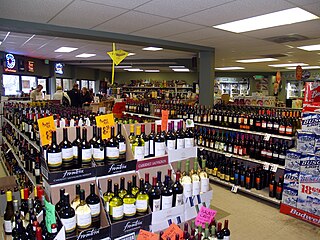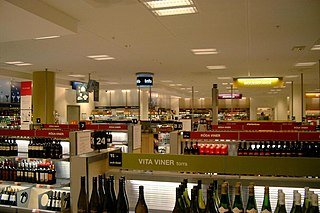Related Research Articles

The Liquor Control Board of Ontario is a Crown corporation that retails and distributes alcoholic beverages throughout the Canadian province of Ontario. It is accountable to the Legislative Assembly through the minister of finance. It was established in 1927 by the government of Premier George Howard Ferguson to sell liquor, wine, and beer. Such sales were banned outright in 1916 as part of prohibition in Canada. The creation of the LCBO marked an easing of the province's temperance regime. By September 2017, the LCBO was operating 651 liquor stores.

Brewers Retail Inc., doing business as The Beer Store, is a Canadian privately owned chain of retail outlets selling beer and other malt beverages in the province of Ontario, Canada. Founded in 1927, it was owned at its inception by a consortium of Ontario-based brewers. It currently operates as a unique open retail and wholesale system primarily owned by three brewing companies, Molson, Labatt and Sleeman, which are owned by multi-national corporations. It is also partially owned by 30 Ontario-based brewers. Under the ownership model, all qualified brewers are free to list their products without discrimination and to set their own selling prices, subject to LCBO price approval that must comply with legislated minimum and uniform pricing requirements.

The Société des alcools du Québec is a provincial Crown corporation and monopoly in Quebec responsible for the trade of alcoholic beverages within the province.

A liquor store is a retail shop that predominantly sells prepackaged liquors – typically in bottles – typically intended to be consumed off the store's premises. Depending on region and local idiom, they may also be called an off-licence, bottle shop or other similar terms. Many jurisdictions have an alcohol monopoly.

The Oregon Liquor Control Commission (OLCC) is a government agency of the U.S. state of Oregon. The OLCC was created by an act of the Oregon Legislative Assembly in 1933, days after the repeal of prohibition, as a means of providing control over the distribution, sales and consumption of alcoholic beverages. To this end, the agency was given the authority to regulate and license those who manufacture, sell or serve alcohol. Oregon is one of 18 alcoholic beverage control states that directly control the sales of alcoholic beverages in the United States. In 2014, the passage of Oregon Ballot Measure 91 (2014) legalized the recreational use of marijuana in Oregon and gave regulatory authority to the OLCC.
Alcoholic beverage control states, generally called control states, are 17 states in the United States that, as of 2016, have state monopoly over the wholesaling or retailing of some or all categories of alcoholic beverages, such as beer, wine, and distilled spirits.
The Alberta Gaming, Liquor and Cannabis Commission is an agency of the government of the Canadian province of Alberta, and regulates alcoholic beverage, recreational cannabis, and gaming-related activities. References to cannabis were added to AGLC's name and governing legislation as cannabis in Canada moved towards legalization in 2018. AGLC was created in 1996 as the Alberta Gaming and Liquor Commission by combining the responsibilities and operations of the Alberta Liquor Control Board (ALCB), Alberta Lotteries, the Alberta Gaming Commission, Alberta Lotteries and Gaming and the Gaming Control Branch. The current Chief Executive Officer is Alain Maisonneuve.
The Washington State Liquor and Cannabis Board, formerly the Washington State Liquor Control Board, is an administrative agency of the State of Washington. The Liquor and Cannabis Board is part of the executive branch and reports to the Governor. The board's primary function is the licensing of on and off premises establishments which sell any type of alcohol, and the enforcement and education of the state's alcohol, tobacco, and cannabis laws.
This article covers various topics involving alcoholic drinks in Canada. The Government of Canada defines an alcoholic drink as "a beverage containing 1.1% or more alcohol by volume."
A liquor license is a governmentally issued permit to sell, manufacture, store, or otherwise use alcoholic beverages.

Prohibition in Canada was a ban on alcoholic beverages that arose in various stages, from local municipal bans in the late 19th century, to provincial bans in the early 20th century, and national prohibition from 1918 to 1920. The relatively large and powerful beer and alcohol manufacturing sector, and the huge working class that purchased their products, failed to convince any of the governments to reverse their stance on prohibition. Most provinces repealed their bans in the 1920s, though alcohol was illegal in Prince Edward Island from 1901 to 1948. By comparison, Ontario's temperance act was in effect from 1916 to 1927.

The Nova Scotia Liquor Corporation (NSLC) is the Crown corporation which controls sales of alcoholic beverages and recreational cannabis in Nova Scotia, Canada. It is the sole distributor for these products and runs all retail outlets selling alcohol and cannabis products. The exceptions are for four private retailers in urban HRM offering beer, wine, and spirits, and, in rural areas where there is not an NSLC location, 23 "agency" liquor stores operated by private retailers on NSLC's behalf.

An alcohol monopoly is a government monopoly on manufacturing and/or retailing of some or all alcoholic beverages, such as beer, wine and spirits. It can be used as an alternative for total prohibition of alcohol. They exist in all Nordic countries except Denmark proper, and in all provinces and territories in Canada except Alberta. In the United States, there are some alcoholic beverage control states, where alcohol wholesale is controlled by a state government operation and retail sales are offered by either state or private retailers.

The alcohol laws of Kansas are among the strictest in the United States, in sharp contrast to its neighboring state of Missouri, and similar to its other neighboring state of Oklahoma. Legislation is enforced by the Kansas Division of Alcoholic Beverage Control.

The alcohol laws of Pennsylvania contain many peculiarities not found in other states, and are considered some of the strictest regulations in the United States.

BC Liquor Stores are a chain of crown corporation retail outlets operated by the British Columbia Liquor Distribution Branch to distribute alcoholic beverages in the province of British Columbia, Canada. They are accountable to the Attorney General of British Columbia. BC Liquor Stores currently operate 196 locations across the province. The chain was established in June 1921, following the result of a plebiscite in favour of liquor availability through government liquor stores. Prior to the plebiscite, alcohol had been illegal through the Prohibition Act, introduced on May 23, 1916, with exceptions to sacramental, medicinal or industrial purposes.

Cannabis in Nunavut, as in the rest of Canada, became legal for recreational use on the effective date of the Cannabis Act on 17 October 2018.

On 17 October 2018, cannabis was legalized in Canada for recreational purposes. It was already legal for medicinal purposes, under conditions outlined in the Marihuana for Medical Purposes Regulations issued by Health Canada, and for seed, grain, and fibre production under licence by Health Canada.

Cannabis in the Northwest Territories became legal when the national Cannabis Act went into force on 17 October 2018.
References
- ↑ "The Nunavut Liquor and Cannabis Commission". Nunavut Department of Finance. Retrieved May 3, 2020.
- ↑ "Nunavut's legal weed sales total 4.2 kilos so far", Nunatisaq News, January 21, 2019
- 1 2 Kathryn Blaze Carlson (April 23, 2010). "Liquor control: Nunavut residents are turning to the underground market for alcohol". National Post. Retrieved July 21, 2012.[ permanent dead link ]
- ↑ "Provincial Fact Sheets". Association of Canadian Distillers. 2008. Archived from the original on December 7, 2008. Retrieved July 21, 2012.
- ↑ Kent Driscoll (July 4, 2005). "Beer war brews". Northern News Service. Archived from the original on February 25, 2012. Retrieved July 21, 2012.